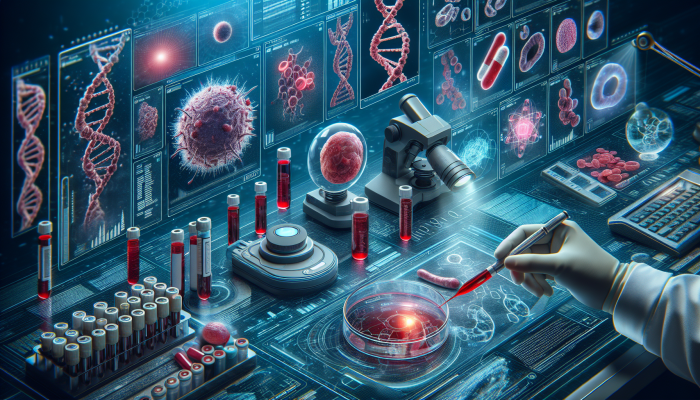Revolutionizing Cancer Detection: The Impact of Advanced Blood Testing and Innovative Technologies
The field of cancer detection is undergoing a remarkable transformation, driven by the latest advancements in blood tests for cancer risk. These revolutionary tests signify a major leap forward in identifying potential <a href="https://homerenonews.com.au/private-blood-tests-a-complete-guide-for-oxford-locals/">cancer markers</a> within the human body. This capability allows for earlier interventions, significantly enhancing patient outcomes and survival rates. To effectively traverse the intricate and often daunting landscape of cancer diagnostics, it is crucial to cultivate a comprehensive understanding of the foundational principles underpinning these tests, along with the newest groundbreaking innovations emerging in this essential healthcare domain.
Exploring the Science Behind Blood Tests for Cancer Risk: In-Depth Analysis and Insights

Central to the efficacy of blood tests for cancer risk is the crucial identification of specific biological indicators referred to as biomarkers. These biomarkers serve as essential signals indicating the presence of possible cancer or an increased risk of developing it in the future. They encompass a wide range of substances, including proteins, genes, and various other materials produced either by cancerous cells or through the body’s immune response to the existence of cancer. The scientific foundation of these innovative tests relies on sophisticated methodologies that proficiently identify these markers, utilizing an extensive array of cutting-edge technologies to improve accuracy and reliability.
One of the hallmark techniques employed in these evaluations is the liquid biopsy. This groundbreaking approach entails analyzing a blood sample to uncover elements such as circulating tumor DNA (ctDNA) and circulating tumor cells (CTCs). The non-invasive nature of this method allows for a comprehensive assessment of a patient’s cancer risk without the necessity for more invasive procedures like traditional biopsies, which can be uncomfortable and carry additional risks. Moreover, advancements in technology, particularly in next-generation sequencing (NGS), have substantially improved the sensitivity and specificity of these tests, enabling them to detect even the most minute traces of ctDNA with remarkable precision.
The precision of blood tests for cancer risk is intricately linked to our understanding of cancer biology. Each type of cancer releases unique biomarkers into the bloodstream, which fuels ongoing research aimed at discovering new markers that could serve as early warning indicators. For example, the levels of prostate-specific antigen (PSA) are frequently monitored to evaluate prostate cancer risk, while the CA-125 marker is commonly associated with the detection of ovarian cancer. This continuous exploration is critical for enhancing early detection and improving treatment strategies.
Additionally, the integration of artificial intelligence (AI) into the analysis of test results is dramatically transforming this field. AI algorithms can process vast datasets, uncovering patterns that may escape human analysis, thereby significantly augmenting the predictive capabilities of these tests and enhancing overall diagnostic accuracy.
Exploring Breakthrough Innovations in Blood Tests for Cancer Risk: Pioneering Developments
The domain of blood tests for cancer risk is currently experiencing extraordinary advancements that have the potential to redefine cancer screening and preventive care approaches. A particularly noteworthy innovation is the introduction of multi-cancer early detection (MCED) tests. These cutting-edge tests are engineered to identify multiple types of cancer from a single blood sample, significantly reducing the need for invasive procedures and enhancing patient comfort throughout the diagnostic process.
Recent research has indicated that MCED tests can effectively identify cancers at their earliest stages, often before any clinical symptoms become evident. This early detection is critical as it is directly correlated with improved treatment outcomes and increased survival rates. For instance, a study published in a prominent oncology journal showcased the remarkable capability of an MCED test to detect malignancies that are typically challenging to diagnose early, including pancreatic cancer and ovarian cancer. Such advancements represent a significant leap forward in the fight against cancer.
Another crucial development within this sector involves the examination of methylation patterns present in circulating DNA as a diagnostic tool. Alterations in methylation patterns often signify cancerous processes, prompting researchers to delve into how these changes can be harnessed for more precise cancer risk assessment. This innovative method could offer a highly sensitive approach to detecting malignancies for which effective screening protocols are currently lacking, thereby markedly enhancing patient care and outcomes.
Furthermore, partnerships between technology firms and healthcare providers are propelling the development of groundbreaking diagnostic solutions. These collaborations aim to harness big data and machine learning to refine blood sample analysis, yielding more accurate risk assessments and tailored management strategies for patients, ultimately improving care quality.
Understanding the Game-Changing Role of Liquid Biopsies in Cancer Detection and Treatment Plans
Liquid biopsies signify a groundbreaking advancement in the landscape of blood tests for cancer risk. Unlike traditional biopsies that necessitate invasive tissue samples, liquid biopsies provide a minimally invasive alternative that can be performed multiple times, allowing for ongoing monitoring of cancer progression and responses to treatment. This feature is particularly beneficial for patients who may not be ideal candidates for surgical biopsies due to varying health conditions.
Liquid biopsies operate by isolating and examining ctDNA or CTCs obtained from a blood sample. The ability to track these cellular components offers vital insights into tumor dynamics and potential genetic mutations that may develop throughout the disease’s progression. For instance, pinpointing specific mutations can aid oncologists in selecting targeted therapies, thereby personalizing treatment plans for improved therapeutic efficacy and success rates in managing cancer.
The incorporation of liquid biopsies into clinical practice is already demonstrating promising results. Recent clinical trials have revealed that these tests can detect recurrences in patients who have previously undergone cancer treatments, often several months earlier than traditional imaging techniques. This timely detection allows for prompt interventions, ultimately enhancing survival rates and overall patient health.
Additionally, liquid biopsies enable real-time monitoring of treatment responses. By assessing ctDNA levels throughout therapy, healthcare professionals can evaluate the effectiveness of the treatment regimen and make necessary adjustments to optimize patient care. This proactive approach signifies a substantial shift toward more dynamic management of cancer care, ensuring that patients receive the most effective treatment tailored to their individual needs and circumstances.
In conclusion, blood tests for cancer risk, particularly through the application of liquid biopsies, are revolutionizing the oncology field. Their capabilities for early detection, continuous disease monitoring, and personalized treatment strategies establish them as essential tools in the ongoing battle against cancer. As research and technological advancements continue to progress, the potential for these tests to enhance patient outcomes and redefine cancer care remains exceptionally optimistic and encouraging.
Connect with Our Facebook Community for the Latest Updates and Insights!

This Article Was Originally Published On https://bloodtest.co.uk
The Article: Blood Tests for Cancer Risk: Pioneering Early Detection Methods first appeared on: https://ezbloodtest.com
The Article Cancer Risk Blood Tests: Innovative Methods for Early Detection Was Found On https://limitsofstrategy.com
Essential References for Further Exploration:
Cancer Risk Blood Tests: Innovative Methods for Early Detection
Cancer Risk Blood Tests: Cutting-Edge Techniques for Detection

